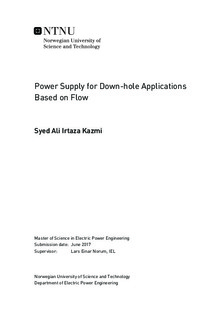Power Supply for Down-hole Applications Based on Flow
Master thesis
Permanent lenke
http://hdl.handle.net/11250/2454736Utgivelsesdato
2017Metadata
Vis full innførselSamlinger
- Institutt for elkraftteknikk [2465]
Sammendrag
The main focus of this thesis is to develop a power supply for feeding power to the down-hole electronic devices such as, instrumentation and communication units. The traditional way of supplying power using long cables from the topside seems to be an expensive approach. So, the present work aims to validate an alternative technique of feeding power to these devices. Numerous types of energy sources are accessible in the process of oil and gas production. The source of kinetic energy from a flowing fluid or gas is one of the useful source of energy which contributes in the generation of electrical power for the down-hole devices.This study mainly focuses on the modelling of a switched mode power supply for down-hole devices using MATLAB/Simulink. The design of the system model is based on the method of using a permanent magnet synchronous generator coupled to a specific type of turbine, which converts the kinetic energy of the flowing fluid into mechanical energy on the shaft. The PMSG converts the mechanical energy of the shaft into uncontrolled electrical power. The output power from the generator is rectified using a three-phase diode rectifier. Moreover, the rectified power is stabilized and supplied to the dc loads using a large filter capacitor and several types of dc-dc converters. The stability of the system for supplying stable power to the dc load is thoroughly investigated in this research work. Consequently, feedback control loops for the dc-dc converters are examined to make a stable power supply using a storage unit and a dump-load. Therefore, the principle objective of the feedback control loops is to regulate the dc link voltage across the filter capacitor. Controlling the power from the source side is not applicable in this method, therefore a pitch angle control is eliminated and not implemented in this thesis.The feedback control loops have been simulated for different cases to investigate the behavior of the system for varying nature of input flow rates and variable load demands. Therefore, various simulation results have been presented to analyze the performance of the system regarding the dc link voltage across the filter capacitor. The system has been examined for three different methods, the first and the second method are inspected by having a storage unit and a dump-load. The third method is considered to analyze the stability of the system without having any storage unit, because rechargeable are batteries not available for very high temperatures. Finally, the feed-back control loops of the system model have been modified by using embedded coder target library which can be implemented on a Texas Instrument micro-controller. The process of code generation and system with a digital controller is studied and simulated using MATLAB/Simulink in the last section of the thesis report.
